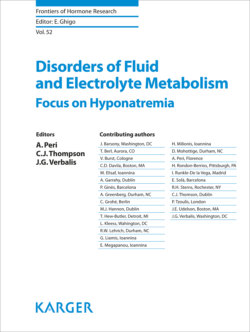Читать книгу Disorders of Fluid and Electrolyte Metabolism - Группа авторов - Страница 39
На сайте Литреса книга снята с продажи.
Cortisol Deficiency
ОглавлениеLow cortisol levels can increase vasopressin release. Cortisol is a well-known inhibitor of vasopressin release from the posterior pituitary [26]. This is probably a direct effect on vasopressin synthesis, as there is an inhibitory glucocorticoid responsive element in the vasopressin gene promoter [27]. Also, cortisol increases the sensitivity of the vascular smooth muscle to the actions of catecholamines [28]. Thus, cortisol deficiency can cause vasoplegia and reduced EABV stimulating vasopressin release. Cortisol deficiency is the result of primary (e.g., adrenal), secondary (i.e., pituitary), and tertiary (i.e., hypothalamic) adrenal insufficiency. However, unique to primary adrenal insufficiency is the combined deficit of not only cortisol but also aldosterone which will cause renal sodium wasting and therefore hypovolemia adding an additional stimulus for vasopressin release (Fig. 2b) [29].
